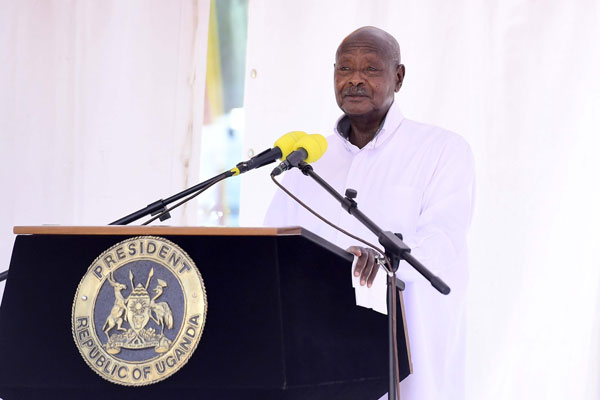
Kampala, Uganda | THE INDEPENDENT | President Yoweri Museveni has warned foreign states and multinationals that the continued exploitation of Africa’s resources with no visible returns is a recipe for political instability. Speaking at the just-ended Uganda-South Africa Trade and Investment Summit in Kampala, Museveni blamed the colonialists and neo-colonialists for the persistent coups and wars in West and Central African states.
It comes as the region has registered seven government takeovers in less than three years, with the most recent this year being in Burkina Faso, Niger and Gabon. Speaking about the need for African states to protect their resources against foreign interests, Museveni said France, which has been taking uranium from Niger should have used some of it to build power plants in the country.
The same, he said, happens with other commodities like coffee and other minerals. He says the colonizers of the affected countries did not mind the welfare of the people and continued “stealing” the resources, due to the failure of the states to build strong armies.
He reiterated his stand against the exportation of raw materials, mainly unprocessed minerals giving the example of uranium in Uganda which he says will never happen for as long as he is around.
Turning to multinationals in Uganda, Museveni said many had been making profits in Uganda without caring to uplift the welfare of the Ugandans, the customers. The summit was organized by state agencies from the two countries and sponsored by South African companies in Uganda including MTN, Nile Breweries, Stanbic, and Absa Banks.
As I closed the Uganda-South Africa Trade & Investment Summit at Speke Resort, Munyonyo, I appealed to the South African investors to join forces with us to ensure that they take advantage of the economic potential of Uganda. This will help build a strong economy for the two… pic.twitter.com/PLnE8DARQv
— Yoweri K Museveni (@KagutaMuseveni) September 6, 2023
MTN and Stanbic are listed on the Uganda Securities Exchange as some of the largest equities, with tens of thousands of Ugandans owning shares therein. Museveni said he was welcoming the changing terrain where the corporations were starting to benefit the ordinary Ugandans adding that he had forgiven them.
Museveni, however, told the companies, especially those in the services sector to help the government’s effort at bringing everyone into the money economy. According to him, this will not only benefit the people and the government, but that the companies because more people will have more purchasing power and boost their profits.
The Group Board Chairman at MTN, Mcebisi Hubert Jonas presented their concerns as foreign investors which he said were hindering the growth of investments. These included corruption, “ambiguous” trade policies, access to finance, contract enforcement, and high costs of doing business including the issue of tariffs, which he urged should be tackled.
He gave the example of how it was expensive to move cargo between two African countries compared to moving the same amount of cargo between India and the East African coast.
At the end of the summit, several resolutions and recommendations were made under what the summit termed “The Kampala Declaration”. Some of the outcomes included agreements to improve transportation and logistics infrastructure between the two countries including retaining the law charges of cargo by Uganda Airlines as it prepares to start flying seven times a week between Johannesburg and Entebbe in October.
Reading the communique, John Mulimba, Foreign Affairs State Minister said they had also agreed to increase four times the number of South African tourist arrivals, and on a partnership to establish an electricity transformer factory in Uganda, among others.
*****
URN
 The Independent Uganda: You get the Truth we Pay the Price
The Independent Uganda: You get the Truth we Pay the Price



